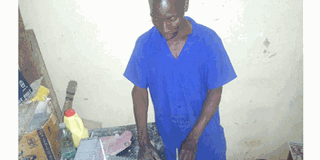Self-taught entrepreneur ‘choking’ off chalk imports

Mr Benjamin Kato, founder of Mutundwe Chalk solutions makes chalk in Mutundwe. Below: A chalk mould where chalk is made. Photos by Christine Kasemiire
He gets his hands dirty just to earn a tidy sum of money.
Benjamin Kato started business with about Shs1m. The business: Making chalk.
Clad in a blue overall, Kato’s hands are filled with white residue from wet chalk.
Kato – the founder and brain behind Mutundwe Chalk Solutions, works out of his parents’ store in Mutundwe.
Here, a spread of chalk sticks are planted on multiple wire mesh boards in the scorching sun. Others are under production in chalk mould – equipment used in making chalk and eventually allowed to dry.
Entrepreneur
After graduating with a Bachelors Degree in Tourism and Hospitality in 2004, he combed the streets of Kampala in search of a job but in vain. Frustrated at his failed job search, he tinkered with the idea of doing business.
In 2014, he sunk his savings into a retail shop.But as any money hungry person, the small business struggled with a low turnover. Multiple taxes, coupled with risks eventually ate into its revenue, culminating into its sale in 2016.
Before putting his business up for sale, Kato wondered where and how chalk is made.
A quick Internet search revealed that most of Uganda’s chalk is imported despite the vast market opportunity of mushrooming schools. So he took up the challenge of manufacturing chalk himself.
“I noticed that there are more than 20 schools in this area, so I looked for something to give them. I started researching how chalk can be made using my smartphone. I used to go to YouTube for the procedures,” he says.
Start up
He also searched off the internet for suppliers of the machine needed to make the chalk. Shs450,000 they said. But Kato did not have it.
When he identified two possible suppliers, he embarked on looking for capital.
After raising the money for the machine in 2014, he held onto it for another two years out of fear of failure.
In 2016 after selling his shop business, riddled with fear, he started operating at the break of the second term holiday. But he was not certain about the market.
“I started wondering whether I would get customers. I started during the second term holiday such that I could start selling at the beginning of third term,” he says.
He used less than Sh100,000 to operate his business. Kato bought a 40 kg bag of powder, an ingredient at Shs75,000, a jerry can of water and lubricants, that is to say cooking oil and paraffin each at Shs5,000.
He had made 100 boxes of the chalk from the 40Kg powder ingredient when the term begun. A friend eased his way to customers.
“When I told my friend about the chalk, he joined me in searching for customers. When we moved, all the boxes were bought in one day by three schools,” Kato says.
From his sales, he expanded his operating capital from 10 additional powder bags and currently 100.

Wet chalk sticks spread on wire mesh to dry.
Current business
Kato now distributes chalk to over 100 schools, bagging a bare minimum of Shs12m per term.
“I currently use a 25 kg bag of powder ingredient because it creates better quality of chalk.
From one bag, I get about 60 boxes of chalk and sell at Shs2,000 each. I buy the packaging boxes at Shs400. I use about 100 or 150 bags per term,” he says.
Private schools, he says, are his main market because of their ability to make quick procurement decisions, vis a vis government aided schools.
His start up in its budding stage employs four people along the production line.
Hiccup
While startups’ mortality rate is proliferating with many failing before their first birthday, Kato’s business is celebrating its third year.
However, his business suffers weather challenges since the chalk is dried in the sun.
“When it rains, it takes longer to dry the chalk which interrupts the flow of business,” he says.
Business Academy
Mutundwe Chalk solutions has benefitted not only from the business training but also prize money from the Orient Bank, Makerere University Business School’s Business Academy.
“I participated in the 2016 business academy and graduated in 2017. I learnt a lot about business and won Shs5m which I used to register my company and improve my packaging,” he explains.
Market
Kato has a vast market opportunity with over 7,210 pre-primary schools, 20,305 primary schools, 2,995 secondary schools according to Uganda Bureau of Statistics abstract 2018.
How to make chalk
Mix 1Kg of powder ingredient with 1 litre of water.
Mix cooking oil and paraffin to make lubricant, which is applied on the machine to ensure the chalk does not break.
Pour the powder mixture in the machine, wait 10 minutes, remove the formed chalk, put it in the sun to dry for between one and two days.



